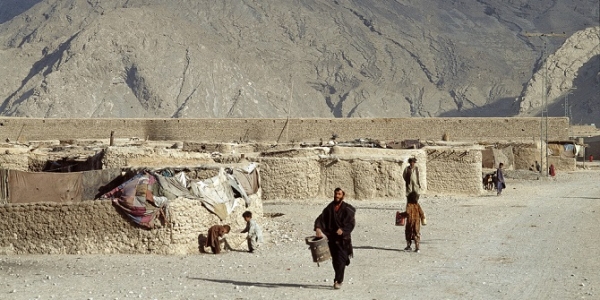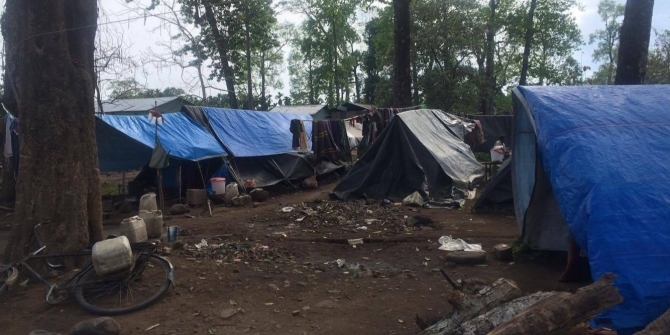 Earlier this year, the Quadrilateral Coordination Group comprised of Afghanistan, Pakistan, China, and the USA was established to facilitate the peace process in Afghanistan. However, there has been little progress to date due to the Taliban’s refusal to participate in talks. Menaal Munshey writes that Pakistan’s reluctance to use its influence over the Afghan Taliban has been part of the issue, and suggests that China’s increasing diplomatic influence in the region could play an important role in moving things forward.
Earlier this year, the Quadrilateral Coordination Group comprised of Afghanistan, Pakistan, China, and the USA was established to facilitate the peace process in Afghanistan. However, there has been little progress to date due to the Taliban’s refusal to participate in talks. Menaal Munshey writes that Pakistan’s reluctance to use its influence over the Afghan Taliban has been part of the issue, and suggests that China’s increasing diplomatic influence in the region could play an important role in moving things forward.
At the heart of Afghanistan’s ongoing political, economic and security challenges is the struggle of the Afghan state. In recent years, the policy of the United Nations and the United States has been to support the Afghan government’s negotiations with the Taliban to establish a viable peace process. However, the Taliban refuses to participate, thereby limiting the impact of the Quadrilateral Coordination Group (QCG) established by the United States in early 2016.
Although it is unlikely that productive negotiations will occur in the QCG setting, there is room for effective diplomacy between members of the QCG (Afghanistan, Pakistan, China, and the USA) who are key stakeholders in the push for peace. As the US presence and influence decreases in Afghanistan, it is time for China to step up as a facilitator of peace talks. Given the high levels of casualties and displacement, the urgency to build a coherent strategy and secure a peaceful future for Afghanistan continues to mount.
Barriers to peace
Pakistan is a key player in the peace process as it is thought to exercise the most influence over the Afghan Taliban, particularly as the state has publicly acknowledged the presence of the Afghan Taliban leadership in Pakistan. Despite this, they have failed to persuade the Taliban to participate in talks so far. Ahmed Rashid contends that Pakistan could exert more influence over the Taliban, but doesn’t appear to be interested in doing so. In particular, Pakistan’s military appears to have no inclination to build a single coherent policy on the Taliban because it still views them in part as allies against India. For example, in June six Taliban militants “surrendered” to the Pakistan military under unknown circumstances. On the other hand, the government of Khyber Pakhtunkhwa, the province bordering Afghanistan, recently agreed to provide $2.86 million to a madrassah where Taliban leadership and other terrorists have been trained. So decisive action is not being taken, and the Taliban and its splinter groups continue to take lives in Pakistan and the reluctance to genuinely facilitate peace in Afghanistan is increasingly frustrating for stakeholders and other members of the QCG.
In May, Afghanistan threatened to lodge a complaint with the United Nations Security Council if Pakistan did not honour its commitment to take strong military action against Taliban leadership present in Pakistan. The Afghan government now views its neighbour as a bigger challenge than the Al-Qaeda and Taliban. At the same time, it is increasingly threatened by the Taliban: 2015 saw the highest number of Afghan civilian casualties since US military action began in 2001. In recent offensives including a twin suicide attack in the heart of Kabul, the Taliban continues to attack state machinery and kill and kidnap government employees. Shocking reports also show the group’s use of child sex slaves to infiltrate state security networks, and launch insider attacks.
Internally, Afghanistan’s leadership risks facing a legitimacy deficit as pressure mounts on the government to take action. The Afghan government struggles with structural problems, and has so far shown limited progress in consolidating their position, while the Taliban continues to make gains. Felbab-Brown proposes that addressing basic governance functions and boosting the capacity of the security sector will help drive the Taliban to the negotiating table, and ultimately assist the peace process.
The Afghan Taliban Chief Mullah Mansour was killed in May in the first drone attack in Balochistan and the second outside FATA. It was a sign of US frustration with Pakistan, and a method of coercing the Taliban to come to the table. However, the drone strike failed to weaken the Taliban or convince them to join peace talks. Instead, it increased distrust between the Taliban, Pakistan and the US. In retaliation, Pakistan announced its plan to deport 1.5 million refugees back to Afghanistan, to remind the US of their key role in the success of the peace process. The Taliban reacted swiftly to the death of Mansour with a change in leadership and in doing so consolidated its support base. Whereas Mansour was seen as motivated by greed, the new leader, Akhundzada, is seen as an ideologically driven and legitimate leader. As a religious leader, he has issued a number of Islamic fatwas, taking a particularly brutal view on women and minority rights. There is no evidence that this change in leadership has weakened the Taliban’s position or made it more susceptible to peacemaking. Instead, talks have stalled, and recent attacks show a demonstration of strength and a belief that a military victory is possible.

China as a growing diplomatic player
To overcome the threat of the Taliban, a clear strategy is required. In this scenario, there is an opportunity for effective and timely diplomacy from the region’s other power player, China.
China can play a positive role in the region by collaborating with Pakistan in bringing the Taliban to the negotiation table. Last year China announced a $46 billion investment project in Pakistan, dwarfing the amount of aid the US provides to Pakistan, and thus increasing their influence. However, for the Pakistani establishment to overcome its historical leanings towards the Taliban, and play a positive role in the peace process, China will have to exert political pressure on Pakistan.
China has begun to exercise stronger diplomacy. In August, China held the inaugural High Level Military Leader Meeting on Quadrilateral Cooperation and Coordination Mechanism in Counter Terrorism with the armed forces of Afghanistan, China, Pakistan, and Tajikistan. The purpose was to build regional consensus on counter terrorism measures and make efforts towards “peaceful development”. This serves China’s strategic interests of increasing trade routes, specifically One Belt One Road (OBOR) and blocking the independence movement in Xinjiang. It may also signal an acceptance within the Chinese government that the QCG is now dysfunctional. It appears that China is adopting the role of soft mediator. In July, the Taliban claimed a delegation had visited China in the first visit to any country under new leadership, a claim which was indirectly confirmed by the Chinese Foreign Ministry. The circumstances of these talks are unclear, however, the Afghan government was critical of China for engaging in these discussions and providing a platform to the Taliban.
Despite this criticism, China has taken a bold step by engaging the Taliban in dialogue. It remains to be seen whether this is a part of a long-term sustained diplomatic strategy which can extract greater cooperation from Pakistan. Without an effective strategy from the members of the QCG and stakeholders in the peace process, the Taliban appears to be the only player with a coherent plan, which is detrimental to peace and dangerous for the Afghan people.
This post gives the views of the author, and not the position of the South Asia @ LSE blog, nor of the London School of Economics. Please read our comments policy before posting.
About the Author
 Menaal Munshey is a PhD candidate at the University of Cambridge. Her research focuses on terrorism, legitimacy, and justice in Pakistan.
Menaal Munshey is a PhD candidate at the University of Cambridge. Her research focuses on terrorism, legitimacy, and justice in Pakistan.
Previously, she has been a researcher with the United Nations University Centre for Policy Research in Tokyo, where her work related to terrorism, organised crime, and peacekeeping. She holds an MPhil in Criminological Research from the University of Cambridge and previously read law at the University of Warwick, with an Erasmus year at Eötvös Loránd University, Budapest. She is a qualified barrister in England and Wales, and has been the recipient of the Sir Albion Richardson scholarship at Gray’s Inn.
Menaal is also a lawyer in Pakistan and acts as the non-resident Senior Research Coordinator at the Legal Aid Office in Karachi.







